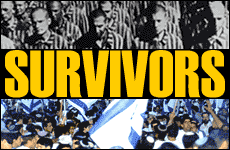 Identifying as a Jew
Identifying as a Jew


5 min read
Holocaust memorials usually fail to convey something vital: Europe's Jews didn't just die; they lived, too.
In the scheme of history, 60 years is not very long. And yet, at least for those of us middle-aged or younger, 1945 seems part of another epoch entirely; the world then, a different planet from our own.
A continent lay in ruins. The Russians reached Berlin and Hitler committed suicide. Germany surrendered and, then, after Hiroshima and Nagasaki, Japan as well.
And the Nazi death camps were liberated.
For Jews, 1945 marked the end not only of a World War but of a calculated and nearly successful plan for genocide. There is little reason to imagine that Hitler would have stopped with the conquest of Europe, nor sufficed with the murder of Europe's Jews alone. And so all of us, in a sense, are survivors.
No wonder our determination to remember, reflect, commemorate. Despite our psychological distance from the Holocaust - or perhaps because of it - we are impelled to honor the memory of the six million precious Jewish souls whom it consumed.
And so we read and write books, build monuments and museums - using words, symbols and artifacts to preserve, as best they can, the details of the inconceivable.
We make pilgrimages to death-camp sites, and pay homage to the memories of parents, grandparents, uncles, aunts and cousins on the very soil that absorbed their blood; we breathe the air that carried their ashes.
The undertakings are inspiring; they seize our thoughts and squeeze our souls.
But at the same time, they usually fail to convey something vital: Europe's Jews didn't just die; they lived, too.
As historian Moshe Halberstal put it, we need to dwell upon "not how we lost, but what we lost" - and, we might add, how we might recapture it.
While remembering the Holocaust must certainly include the fact that incredible numbers of Jews were annihilated by the Germans and their many eager allies, that itself is not enough. The most crucial memorializing of those Jewish martyrs is a focus not on the lost Jewish lives but on the lost Jewish life, the timeless ideals and dedication to the Jewish religious tradition that characterized so much of pre-Holocaust Jewish Europe.
As historian Moshe Halberstal put it, we need to dwell upon "not how we lost, but what we lost" - and, we might add, how we might recapture it.
To be sure, there were Jews in pre-war Europe who abandoned the faith and practices of their forebears, but what they had rejected was in fact just that - the essence of their forbears' lives, and those of their brothers and sisters.
Just over 60 days ago at this writing - I needn't consult a calendar; the Daf Yomi Talmud-study program is on the 62nd page of its first tractate - hundreds of thousands of Jews gathered worldwide to celebrate the Talmud, the prime repository of Jewish religious law. It was no coincidence that the event, which packed Madison Square Garden, the Continental Airlines Arena and dozens of other venues across the country and around the world, was dedicated to the memory of the Six Million.
Jewish tradition considers it of great benefit to the souls of the deceased when the living study Torah or improve their religious observance on their behalf. Even here on earth, though, by embracing what so many of those killed for being Jews stood for and lived for, in a way we provide them new life.
And at the same time, we meaningfully address something else too: the contemporary Jewish crisis of "continuity." For by doing more than merely remembering the Jewish loss of the war years, by actually overcoming its effects, at least on the spiritual stratum, the Jewish world not only reconnects to its past - it ensures its future. Our collective Jewish heritage is the time-tested solution to assimilation; observance of our religious tradition is what preserved us as a people throughout history. It alone has the power to do so now as well.
There is a Jewish holiday most focused on continuity; as it happens, it is the one just past. Passover is the time of "You shall tell your children," the season for planting the seeds of Jewish identity, of the Jewish future, in the fertile minds of our young. And it is tethered in a singular way - by the count-up of the "Days of the Omer" - to the Jewish holiday we will observe in mere weeks. Shavuot is Passover's conclusion; it establishes the essence of our identity and the key to our future. Because it commemorates the day we were given the Torah.
Sixty years after the end of the Holocaust, PassoverShavuot, that binary star in the firmament of the Jewish year, speaks most poignantly to all of us Jews - all of us survivors. What it tells us is that we must continue to survive, and that the way to do that is to remain true to the peoplehood forged on the very first Passover - and to the mission with which we were charged fifty days later, at the foot of Mount Sinai.
© AM ECHAD RESOURCES
